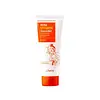What's inside
What's inside
 Key Ingredients
Key Ingredients

 Benefits
Benefits

 Concerns
Concerns

 Ingredients Side-by-side
Ingredients Side-by-side

Water
Skin ConditioningCocamidopropyl Betaine
CleansingGlycerin
HumectantAcrylates Copolymer
1,2-Hexanediol
Skin ConditioningSodium Chloride
MaskingCoptis Japonica Root Extract
Skin ConditioningHippophae Rhamnoides Extract
MaskingSalicylic Acid
MaskingAscorbic Acid
AntioxidantAcrylates/C10-30 Alkyl Acrylate Crosspolymer
Emulsion StabilisingTromethamine
BufferingChlorhexidine Digluconate
AntimicrobialCitrus Paradisi Peel Oil
MaskingLimonene
PerfumingWater, Cocamidopropyl Betaine, Glycerin, Acrylates Copolymer, 1,2-Hexanediol, Sodium Chloride, Coptis Japonica Root Extract, Hippophae Rhamnoides Extract, Salicylic Acid, Ascorbic Acid, Acrylates/C10-30 Alkyl Acrylate Crosspolymer, Tromethamine, Chlorhexidine Digluconate, Citrus Paradisi Peel Oil, Limonene
Water
Skin ConditioningLauryl Hydroxysultaine
CleansingAcrylates Copolymer
Sodium Chloride
MaskingSodium Methyl Cocoyl Taurate
CleansingDisodium Cocoamphodiacetate
CleansingPotassium Cocoyl Glycinate
Potassium Cocoate
EmulsifyingDipropylene Glycol
HumectantHydroxyacetophenone
AntioxidantCaprylyl Glycol
EmollientRosmarinus Officinalis Leaf Oil
MaskingHouttuynia Cordata Powder
Skin ConditioningHexylene Glycol
EmulsifyingEthylhexylglycerin
Skin ConditioningDisodium EDTA
Dipotassium Glycyrrhizate
HumectantTocopherol
AntioxidantWater, Lauryl Hydroxysultaine, Acrylates Copolymer, Sodium Chloride, Sodium Methyl Cocoyl Taurate, Disodium Cocoamphodiacetate, Potassium Cocoyl Glycinate, Potassium Cocoate, Dipropylene Glycol, Hydroxyacetophenone, Caprylyl Glycol, Rosmarinus Officinalis Leaf Oil, Houttuynia Cordata Powder, Hexylene Glycol, Ethylhexylglycerin, Disodium EDTA, Dipotassium Glycyrrhizate, Tocopherol
Ingredients Explained
These ingredients are found in both products.
Ingredients higher up in an ingredient list are typically present in a larger amount.
Acrylates Copolymer is used as a film-forming agent and texture enhancer.
After applied, Acrylates Copolymer forms a thin film cover that helps skin feel more soft. It can help sunscreens become more water-resistant.
It is also used to make a product more thick.
Learn more about Acrylates CopolymerChances are, you eat sodium chloride every day. Sodium Chloride is also known as table salt.
This ingredient has many purposes in skincare: thickener, emulsifier, and exfoliator.
You'll most likely find this ingredient in cleansers where it is used to create a gel-like texture. As an emulsifier, it also prevents ingredients from separating.
There is much debate on whether this ingredient is comedogenic. The short answer - comedogenic ratings don't tell the whole story. Learn more about comegodenic ratings here.
The concensus about this ingredient causing acne seems to be divided. Research is needed to understand if this ingredient does cause acne.
Scrubs may use salt as the primary exfoliating ingredient.
Learn more about Sodium ChlorideWater. It's the most common cosmetic ingredient of all. You'll usually see it at the top of ingredient lists, meaning that it makes up the largest part of the product.
So why is it so popular? Water most often acts as a solvent - this means that it helps dissolve other ingredients into the formulation.
You'll also recognize water as that liquid we all need to stay alive. If you see this, drink a glass of water. Stay hydrated!
Learn more about Water